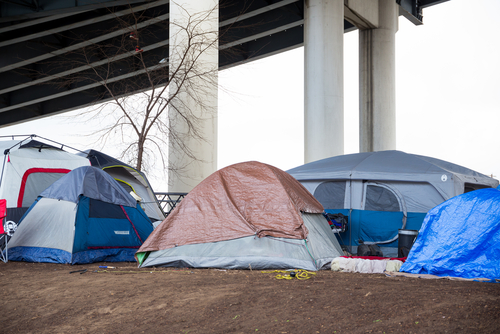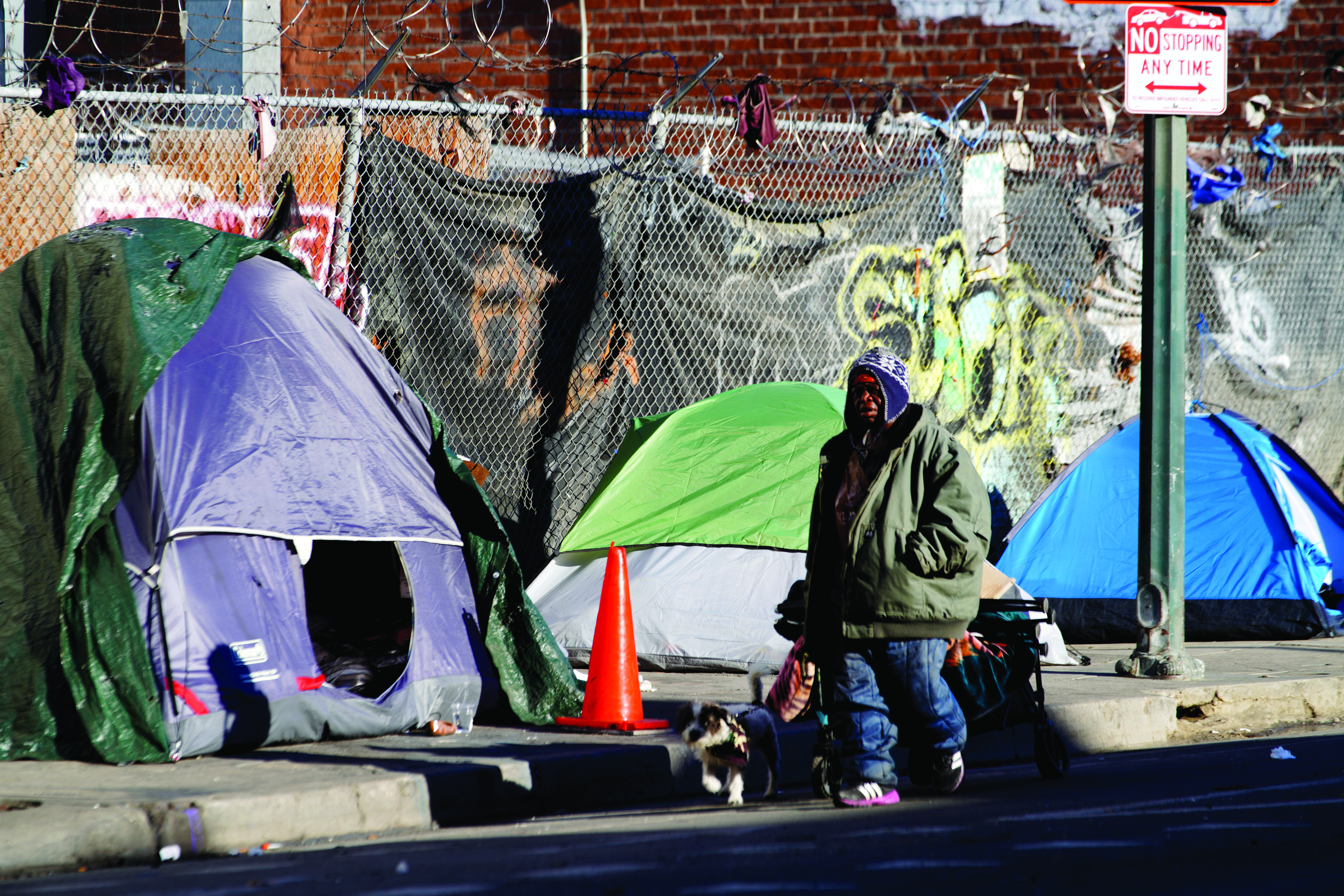Supreme Court will consider whether criminalizing homelessness violates Eighth Amendment

Homeless camps with tents and tarp shelter under a bridge in downtown Portland, Oregon, in February 2016. (Photo from Shutterstock. Adjacent photo by Richard Vogel/The Associated Press)
In 2013, the small Oregon city of Grants Pass debated how to deal with what public officials and others perceived to be a sharp increase in vagrancy and homelessness.
The community of more than 38,000 in southern Oregon had an unhoused population of at least 600 people who slept in cars, tents or were exposed to the elements around downtown and city parks.
Many strategies were discussed at a community forum, including buying one-way bus tickets out of town for homeless residents. But many of those people were “returned to Grants Pass with a request from the other location to not send them there,” meeting minutes say.
One city council member then proposed, according to the minutes, “mak[ing] it uncomfortable enough for [homeless people] in our city so they will want to move on down the road.”
The city began aggressive enforcement of a series of ordinances that bar “camping” on public property, which covered any bedding or blankets and any place where a person rested or slept, including tents and vehicles. Each violation was subject to a $295 fine, and two citations would subject violators to an exclusion order that made them guilty of criminal trespass if they remained on public property.
“People were being awakened in the middle of the night and being told there is nowhere in the city they were allowed to be,” says Edward Johnson, director of litigation for the Oregon Law Center. “They were getting the tickets, and then they were getting arrested for criminal trespass and going to jail.”
The statewide advocacy group helped organize a lawsuit challenging the city’s aggressive enforcement as punishing and criminalizing the status of homelessness in violation of the Eighth Amendment’s ban on cruel and unusual punishments.
They won in federal district court and had a significant, though scaled back, victory in the 9th U.S. Circuit Court of Appeals. The San Francisco-based appeals court in 2018 had issued a major ruling in a case, Martin v. City of Boise, holding that the government cannot punish homeless people for resting or sleeping outside when “they have no access to shelter.”
“As long as there is no option of sleeping indoors, the government cannot criminalize indigent, homeless people for sleeping outdoors, on public property, on the false premise they had a choice in the matter,” the 9th Circuit said in Martin.
In the Grants Pass case, the 9th Circuit extended its decision in the Boise case, which involved criminal violations, to include civil citations. It also upheld the certification of a class of plaintiffs.
 Related article from the ABA Journal magazine: “New California law placing unhoused individuals with addictions in conservatorships faces questions”
Related article from the ABA Journal magazine: “New California law placing unhoused individuals with addictions in conservatorships faces questions”
While the U.S. Supreme Court had passed up the chance to review the Boise decision, the court granted review of Grants Pass’ appeal.
“Across the West, cities face a growing humanitarian tragedy,” the city told the high court in asking it to take up the case. “Hundreds of thousands of people camp in public, their tents and belongings overtaking sidewalks, parks and trails. Cities want to help those in encampments get the services they need while ensuring that our communities remain safe, but they find themselves hamstrung in responding to public encampments and the drug overdoses, murders, sexual assaults, diseases and fires that inevitably accompany them.”
Theane D. Evangelis, a Los Angeles-based partner at Gibson, Dunn & Crutcher who will argue the city’s case, says the 9th Circuit’s decisions “are hurting the very people they purport to protect.”
“We think courts should not be thrust into the role of micromanaging homeless people,” she says. “Instead, it should be up to the people to address through their representatives at the state and local level.”
Californians wrestling with similar issues
Few doubt that the court’s decision in City of Grants Pass v. Johnson will be consequential for the nation’s homeless population and for those trying to help.
“This case is really about whether the Constitution protects unhoused people against punishment when there is no shelter or housing available to them,” says Antonia K. Fasanelli, the executive director of the National Homelessness Legal Center, a Washington, D.C.-based group that filed an amicus supporting the homeless plaintiffs who challenged the Oregon city’s policies. “Fundamentally, we know that criminalization only makes homelessness worse.”
There is a fundamental division in the case. Dozens, if not scores of social justice groups, religious organizations, social scientists and politicians side with the homeless challengers.
But many states, municipal governments and their advocacy groups, and others side with Grants Pass.
“Homelessness is complicated. The constitutional question presented in this case is not,” Seattle City Attorney Ann Davison says in an amicus brief for her city and a dozen others, along with city and county associations.
The 9th Circuit imposed a rule that says, “local governments must first provide an alternative place to go before telling someone they cannot stay where they are,” Davison wrote. “That rule is a rigid policy judgment.”
The divide is highlighted by the number of amicus briefs from California, a state in the 9th Circuit where homelessness has long been a salient issue.
“The case now before this court is an example of how implementation of Martin has become unworkable,” says a brief in support of Grants Pass from the California State Association of Counties. “The opinion significantly restricts the ability to enforce camping ordinances … by allowing a class certification that eliminates the individualized determination of whether a person subject to enforcement of an ordinance has available shelter.”
The state of California, the city of San Francisco, and California Gov. Gavin Newsom, a Democrat and former San Francisco mayor, filed separate briefs that officially support neither party and seek to walk a fine line.
San Francisco says that the 9th Circuit’s decision in Grants Pass has led a federal judge to block state and local laws that limit when individuals may sleep or erect tents on public property “as long as there are more homeless individuals in San Francisco than there are shelter beds available.”
“It would cost San Francisco an extraordinary $1.45 billion—or more than one third of San Francisco’s general fund—to provide housing for all individuals experiencing homelessness within San Francisco,” the city says.
Newsom, in his own brief, says the 9th Circuit’s ruling against criminal sanctions on homeless people was sensible and narrow, but the court’s Grants Pass decision “has effectively created an affirmative right for individuals to erect structures and camp on public property until the individual receives an offer of shelter or housing.”
But a brief for several current and former San Francisco officials, in support of the homeless challengers to the Grants Pass ordinances, argues that California and many of its cities (including San Francisco) are seeking to banish the homeless through “Draconian” vacancy laws.
“San Francisco has cited, fined, and arrested hundreds of unhoused residents for the sole crime of having nowhere to sleep in violation of the Eighth Amendment, the city’s own clear laws and policies that predate Martin and basic common sense,” says the brief.
A 2002 Dodge minivan and a ‘sweet’ rottweiler
Grants Pass has a few things in common with San Francisco—generally warm days and cool nights, rolling fog and proximity to the mountains. But it is obviously a much smaller place.
The city has just one homeless shelter, the Gospel Rescue Mission, whose 138 beds often go empty because some homeless people will not agree to the mission’s rules including work requirements, no drug or alcohol use and no pets.
The lead plaintiff in the challenge to the Grants Pass ordinances is now 73-year-old retired nurse names Gloria Johnson, who had been living in her 2002 Dodge Grand Caravan with her dog, Echo, for three years at the time of her 2019 deposition in the case.
She had been evicted from her last place of residence at that time, and she would park the van on city streets or parks in Grants Pass, as well as sometimes in a grocery parking lot or on property outside city limits.
She was cited once under the city’s ordinances and asked by police to move along many other times.
“I have been told by police that it is illegal for me to sleep in my van anywhere in Grants Pass city limits and that I must leave town if I want to sleep in my van,” she said in a court document.
At the deposition, Johnson explained under questioning by a lawyer for the city that she would not want to reside at the Gospel Union Mission because of its rules, including because she could not be with her dog. “Got a very sweet Rottweiler,” Johnson said.
The lawyer pressed her on why she had not moved elsewhere.
“I just haven’t—I know nobody in any other area but Grants Pass,” Johnson said.
When the lawyer asked why she had not found housing, she referred to her modest monthly Social Security check.
“Well, I don’t know,” Johnson said. “Have you looked for a house with $1,600 yourself? You know that you can get into for $1,600? It’s not out there.”
See also:
“Does banning camping by homeless people violate Eighth Amendment? Supreme Court agrees to decide”


